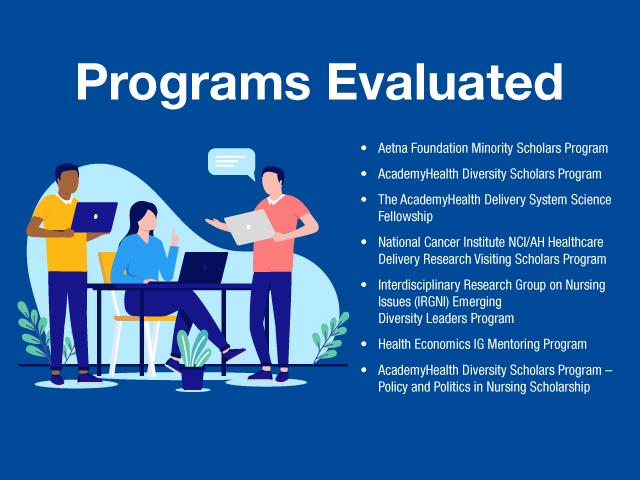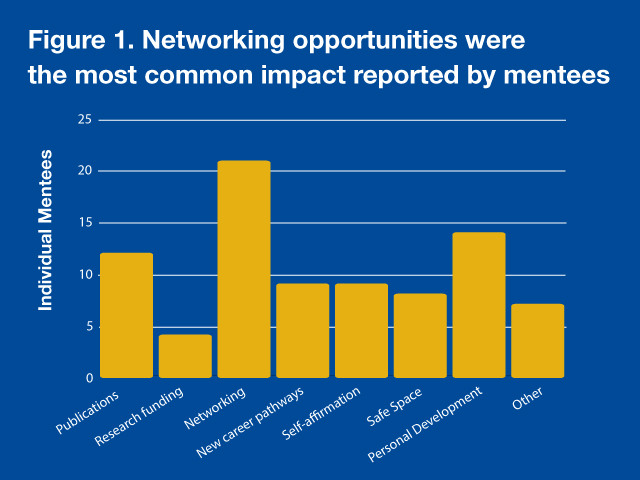
AcademyHealth has sponsored seven fellowship and scholarship programs since 2010, providing professional development opportunities for individuals from historically excluded and underrepresented communities in health services and policy research (HSR). To improve our understanding of the impact on participants of the mentoring components of these programs, AcademyHealth conducted a survey of program alumni in spring 2023 to identify what has been effective and what can be improved upon for future programs.
AcademyHealth’s scholarship and fellowship programs have varied over the years.
The program alumni survey inquired about the following topics:
- Amount of contact (one-hour meetings, meetings once per month, etc.)
- Mentor/mentee career and research interest alignment
- Primary benefits to mentees (e.g., networking, self-affirmation, personal development, etc.)
- Mentees’ advice for future programs
- Mentors’ advice for future programs
Of 226 program participants, 56 individuals (24.8 percent) responded to the invitation to participate. The respondents included 44 mentees and 12 mentors. Because the numbers of program participants, numbers of mentors, type of mentorship model (individual vs. group) and degree of mentor matching performed by AcademyHealth varied across programs and across years, we aggregated responses for mentees and mentors. While our assessment is primarily descriptive, the respondents also suggested directions for future programs.
Responses suggest common themes among mentors and mentees.
Amount of contact. Of the 44 responding mentees, 17 (44 percent) met with their mentor once and 7 (15 percent) met monthly over the course of a year, usually for up to one hour. For the 5 mentees who participated in the Emerging Diversity Leaders (EDL) Program, 60 percent (3 of 5) met with their mentors monthly over the course of a year, usually for 1-3 hours, and 40 percent (2 of 5) met monthly for longer than one year. The EDL mentorship model is unique in that it provides both group and individual mentorship, as well as peer-to-peer mentorship.
Alignment of interests. More than half of the mentees and mentors reported their research and career interests were aligned. Mentees valued the opportunity to be matched with a mentor whose area of interest and training, professional pathways, and lived experience align with their own and they viewed it as important to have a strong pool of diverse mentors. Mentors who worked with mentees outside their own areas of expertise appreciated being able to learn about new topics.
Impact

As shown in Figure 1, the top benefit for mentees was networking, reported by two-thirds of the responding mentees (21 of 31). Other leading responses were support for personal development and help with publications. The top three responses for EDL mentees were publications, networking, and self-affirmation.
Mentors’ perspectives on benefits to mentees were similar. More than 90 percent (11 of 12) mentioned networking and more than 80 percent (10 of 12) reported “self-affirmation.” Additionally, more than 90 percent of the mentors (11 of 12) reported that mentorship is rewarding because of the opportunity to provide guidance to and learn from early career professionals.
Suggestions for Future Program Improvements
- Increase financial support. More than 60 percent of mentees (25 of 39) and 70 percent of mentors (7 of 10) mentioned that increasing program support could cover such costs as conference registrations and travel, training and honoraria for mentors, and increased staff time to arrange more meetings.
- Increase program structure. Half of the mentors mentioned training for mentors and creation of guidelines and a mentor-mentee contract as valuable, including having a clear set of goals/objectives for each meeting with mentees. Increased staff time for mentor matching was also suggested.
- Increase engagement. Given that networking was the top benefit, it is not surprising that many mentees would like more opportunities for year-round professional development through presentations, assistance with publications, and opportunities to meet more HSR experts through office hours, affinity groups, etc.
Conclusions for future mentorship program improvement and development
Taken as a whole, these findings suggest that future AcademyHealth mentoring programs will benefit from sustained funding to cover increases in staff time, support mentees who attend and present at conferences and provide financial incentives to acknowledge mentors’ time. All mentees and mentors have been invited to attend the Annual Diversity Networking Receptions at the AcademyHealth Annual Research Meeting, which has provided additional networking opportunities and helped to build a community of practice for those who support workforce diversity in HSR.
Across programs, mentors and mentees suggested that the mentor-mentee relationship could benefit from increased financial support, more structure, more training, and creation of a mentor-mentee contract or memorandum of agreement. Looking ahead, AcademyHealth is exploring how to formalize mentor-mentee relationships through providing additional structure (e.g., training and guidance for mentees and mentors, memoranda of understanding/contracts, etc.) and additional source of funding.
Acknowledgements
Thanks to Danielle DeCosta and Karlye Phillips for their contributions to developing and distributing the survey and analyzing and reporting the data.